Psychology Report: Analyzing Robert's Social Development Challenges
VerifiedAdded on 2020/04/29
|6
|1302
|80
Report
AI Summary
This report presents an analysis of Robert's social development, based on an interview with his mother. The report highlights the challenges Robert faces due to limited social interaction, a single-parent household, and a lack of maternal bonding. It explores how these factors have influenced his personality, transforming him from an extroverted child to a more withdrawn and independent individual. The report utilizes Erik Erikson's Theory of Psychosocial Development and Bronfenbrenner's Ecological Systems Theory to explain the impact of Robert's environment on his social and emotional well-being. It emphasizes the importance of social interaction, emotional support, and the need for a more supportive environment to foster positive social development, recommending increased social opportunities and parental attention. The report concludes by underscoring the long-term significance of early social experiences in shaping a child's behavior and personality.
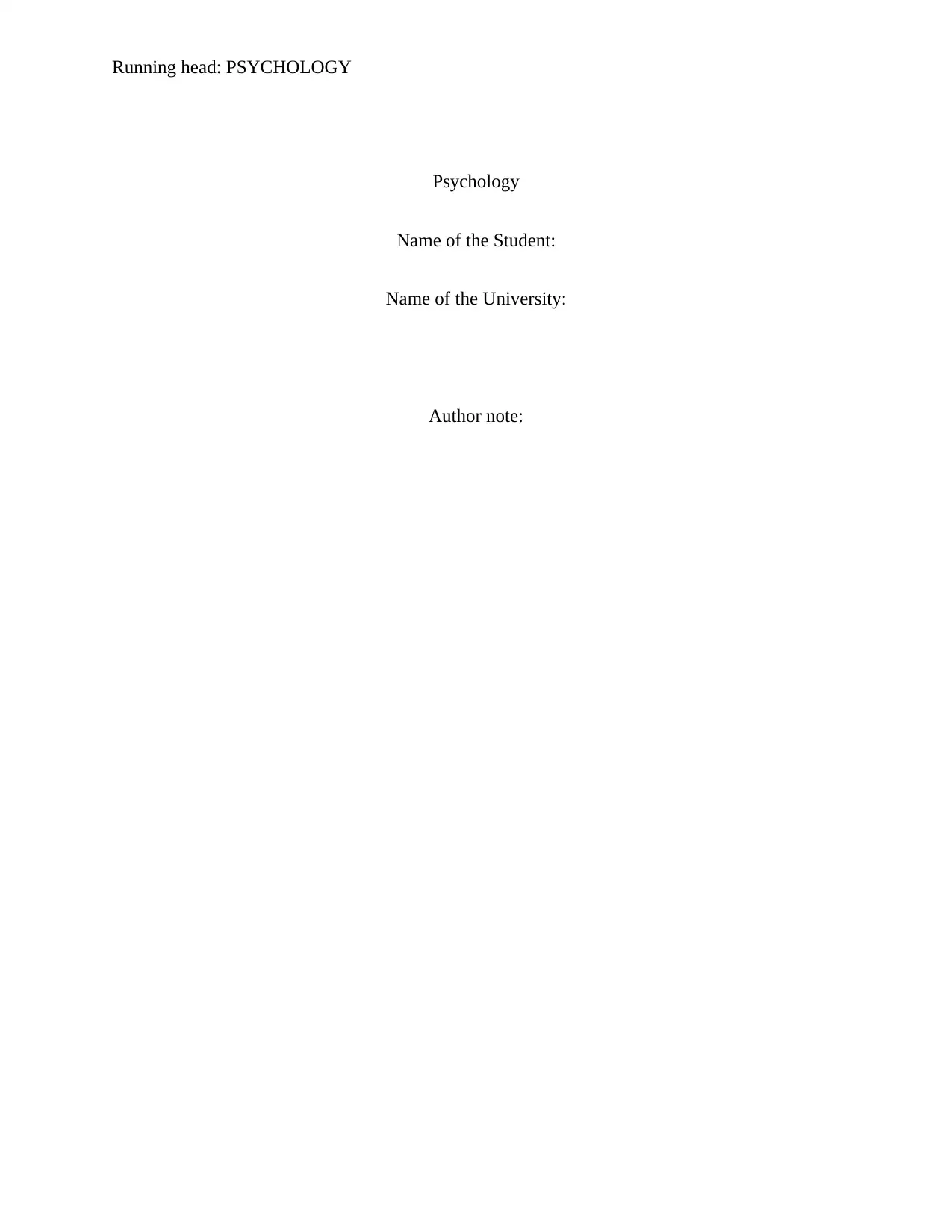
Running head: PSYCHOLOGY
Psychology
Name of the Student:
Name of the University:
Author note:
Psychology
Name of the Student:
Name of the University:
Author note:
Paraphrase This Document
Need a fresh take? Get an instant paraphrase of this document with our AI Paraphraser
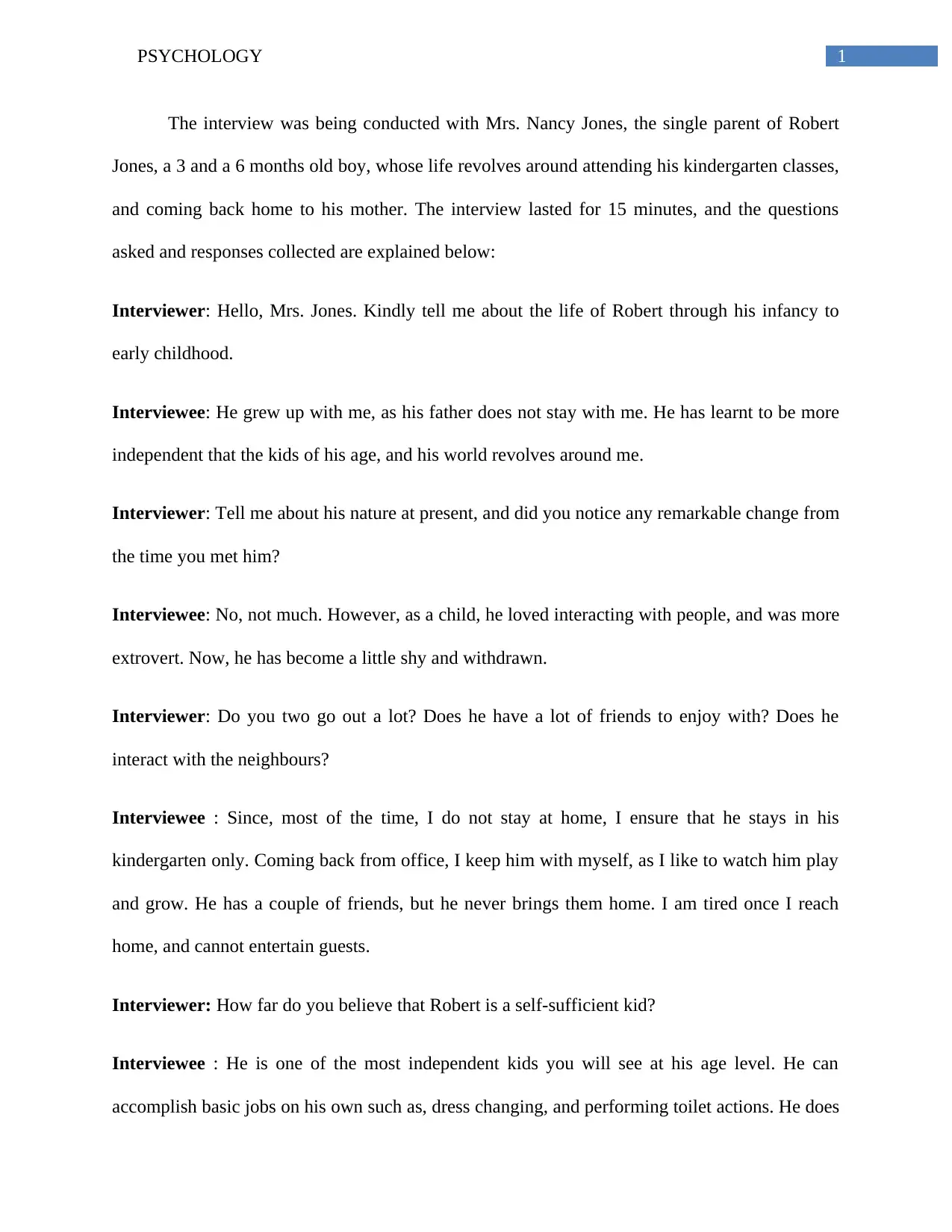
1PSYCHOLOGY
The interview was being conducted with Mrs. Nancy Jones, the single parent of Robert
Jones, a 3 and a 6 months old boy, whose life revolves around attending his kindergarten classes,
and coming back home to his mother. The interview lasted for 15 minutes, and the questions
asked and responses collected are explained below:
Interviewer: Hello, Mrs. Jones. Kindly tell me about the life of Robert through his infancy to
early childhood.
Interviewee: He grew up with me, as his father does not stay with me. He has learnt to be more
independent that the kids of his age, and his world revolves around me.
Interviewer: Tell me about his nature at present, and did you notice any remarkable change from
the time you met him?
Interviewee: No, not much. However, as a child, he loved interacting with people, and was more
extrovert. Now, he has become a little shy and withdrawn.
Interviewer: Do you two go out a lot? Does he have a lot of friends to enjoy with? Does he
interact with the neighbours?
Interviewee : Since, most of the time, I do not stay at home, I ensure that he stays in his
kindergarten only. Coming back from office, I keep him with myself, as I like to watch him play
and grow. He has a couple of friends, but he never brings them home. I am tired once I reach
home, and cannot entertain guests.
Interviewer: How far do you believe that Robert is a self-sufficient kid?
Interviewee : He is one of the most independent kids you will see at his age level. He can
accomplish basic jobs on his own such as, dress changing, and performing toilet actions. He does
The interview was being conducted with Mrs. Nancy Jones, the single parent of Robert
Jones, a 3 and a 6 months old boy, whose life revolves around attending his kindergarten classes,
and coming back home to his mother. The interview lasted for 15 minutes, and the questions
asked and responses collected are explained below:
Interviewer: Hello, Mrs. Jones. Kindly tell me about the life of Robert through his infancy to
early childhood.
Interviewee: He grew up with me, as his father does not stay with me. He has learnt to be more
independent that the kids of his age, and his world revolves around me.
Interviewer: Tell me about his nature at present, and did you notice any remarkable change from
the time you met him?
Interviewee: No, not much. However, as a child, he loved interacting with people, and was more
extrovert. Now, he has become a little shy and withdrawn.
Interviewer: Do you two go out a lot? Does he have a lot of friends to enjoy with? Does he
interact with the neighbours?
Interviewee : Since, most of the time, I do not stay at home, I ensure that he stays in his
kindergarten only. Coming back from office, I keep him with myself, as I like to watch him play
and grow. He has a couple of friends, but he never brings them home. I am tired once I reach
home, and cannot entertain guests.
Interviewer: How far do you believe that Robert is a self-sufficient kid?
Interviewee : He is one of the most independent kids you will see at his age level. He can
accomplish basic jobs on his own such as, dress changing, and performing toilet actions. He does
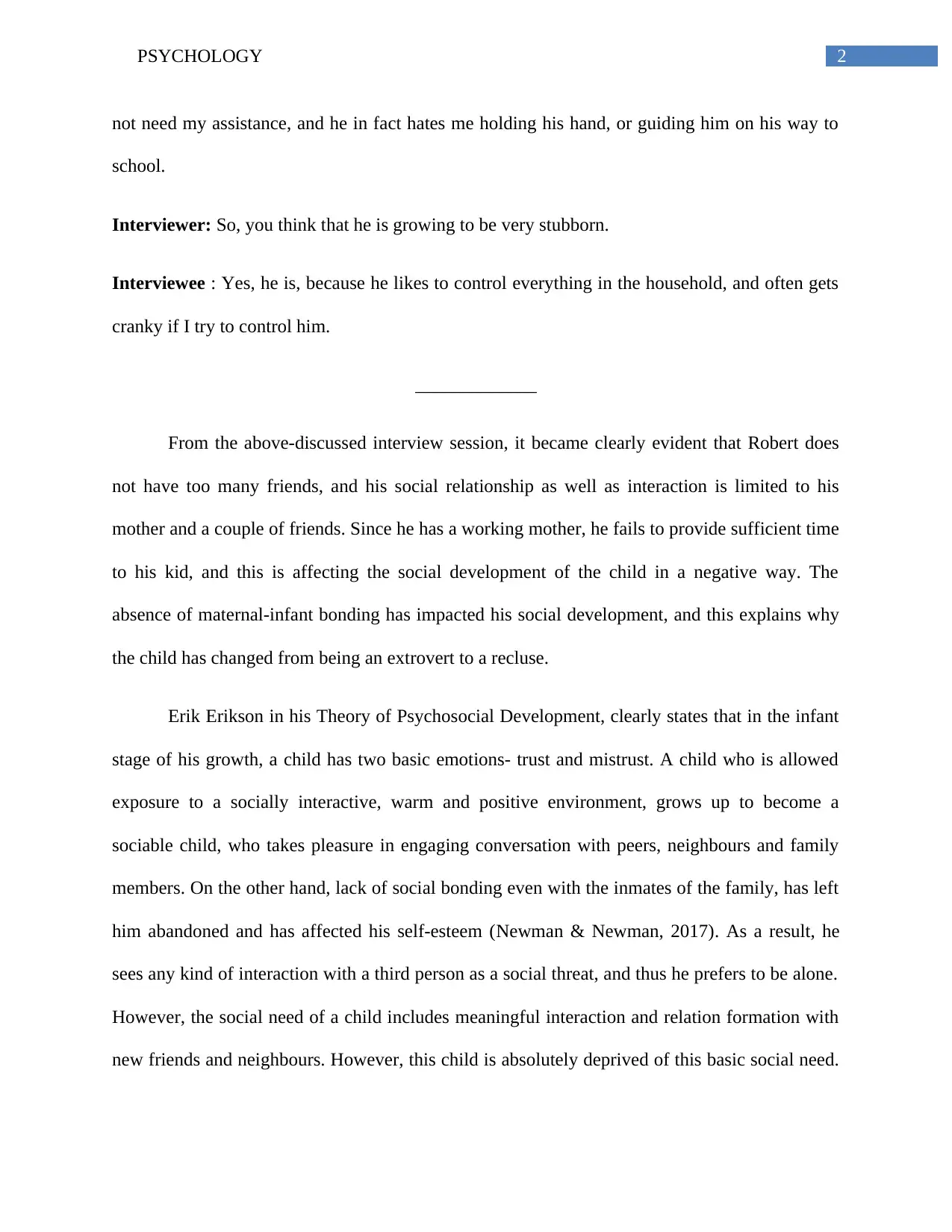
2PSYCHOLOGY
not need my assistance, and he in fact hates me holding his hand, or guiding him on his way to
school.
Interviewer: So, you think that he is growing to be very stubborn.
Interviewee : Yes, he is, because he likes to control everything in the household, and often gets
cranky if I try to control him.
_____________
From the above-discussed interview session, it became clearly evident that Robert does
not have too many friends, and his social relationship as well as interaction is limited to his
mother and a couple of friends. Since he has a working mother, he fails to provide sufficient time
to his kid, and this is affecting the social development of the child in a negative way. The
absence of maternal-infant bonding has impacted his social development, and this explains why
the child has changed from being an extrovert to a recluse.
Erik Erikson in his Theory of Psychosocial Development, clearly states that in the infant
stage of his growth, a child has two basic emotions- trust and mistrust. A child who is allowed
exposure to a socially interactive, warm and positive environment, grows up to become a
sociable child, who takes pleasure in engaging conversation with peers, neighbours and family
members. On the other hand, lack of social bonding even with the inmates of the family, has left
him abandoned and has affected his self-esteem (Newman & Newman, 2017). As a result, he
sees any kind of interaction with a third person as a social threat, and thus he prefers to be alone.
However, the social need of a child includes meaningful interaction and relation formation with
new friends and neighbours. However, this child is absolutely deprived of this basic social need.
not need my assistance, and he in fact hates me holding his hand, or guiding him on his way to
school.
Interviewer: So, you think that he is growing to be very stubborn.
Interviewee : Yes, he is, because he likes to control everything in the household, and often gets
cranky if I try to control him.
_____________
From the above-discussed interview session, it became clearly evident that Robert does
not have too many friends, and his social relationship as well as interaction is limited to his
mother and a couple of friends. Since he has a working mother, he fails to provide sufficient time
to his kid, and this is affecting the social development of the child in a negative way. The
absence of maternal-infant bonding has impacted his social development, and this explains why
the child has changed from being an extrovert to a recluse.
Erik Erikson in his Theory of Psychosocial Development, clearly states that in the infant
stage of his growth, a child has two basic emotions- trust and mistrust. A child who is allowed
exposure to a socially interactive, warm and positive environment, grows up to become a
sociable child, who takes pleasure in engaging conversation with peers, neighbours and family
members. On the other hand, lack of social bonding even with the inmates of the family, has left
him abandoned and has affected his self-esteem (Newman & Newman, 2017). As a result, he
sees any kind of interaction with a third person as a social threat, and thus he prefers to be alone.
However, the social need of a child includes meaningful interaction and relation formation with
new friends and neighbours. However, this child is absolutely deprived of this basic social need.
⊘ This is a preview!⊘
Do you want full access?
Subscribe today to unlock all pages.

Trusted by 1+ million students worldwide
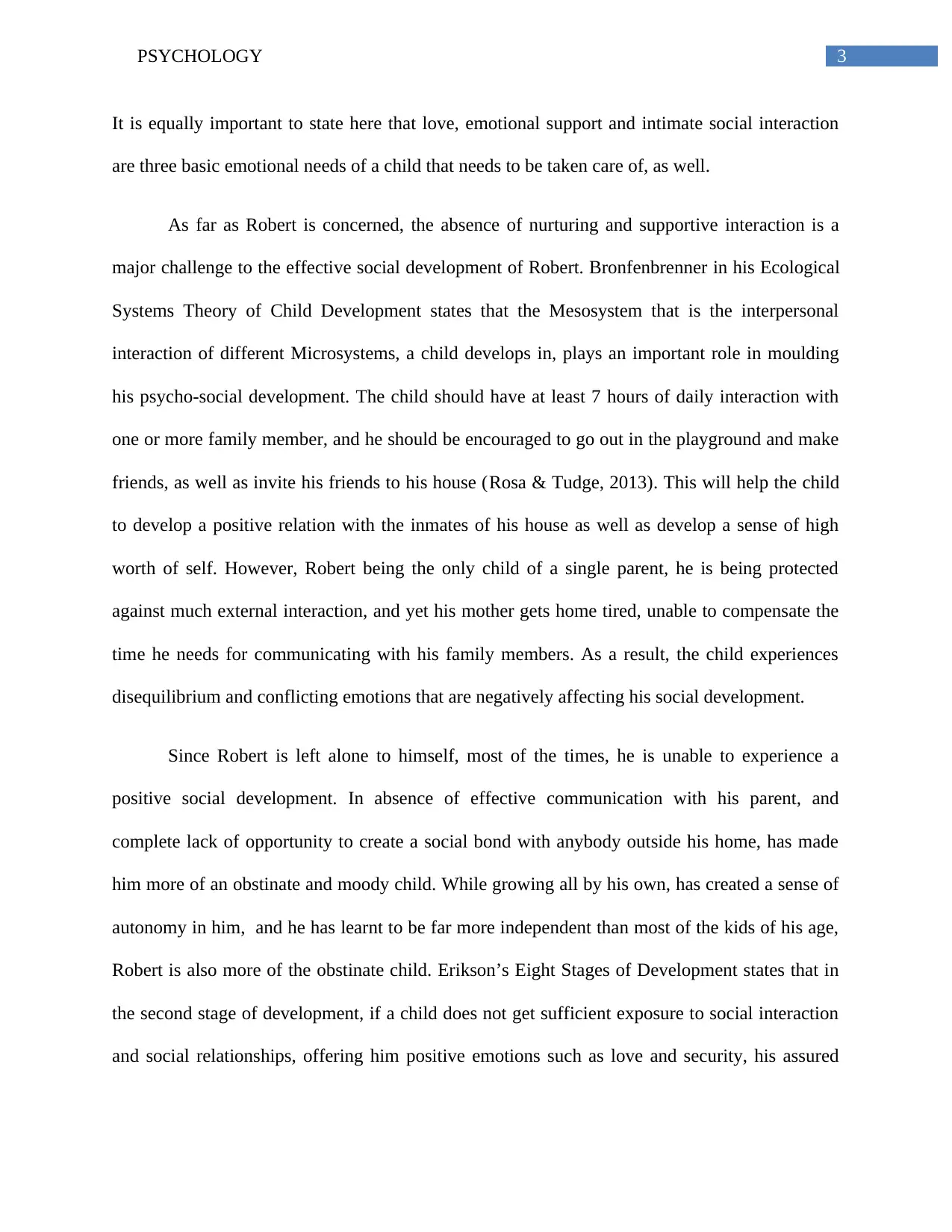
3PSYCHOLOGY
It is equally important to state here that love, emotional support and intimate social interaction
are three basic emotional needs of a child that needs to be taken care of, as well.
As far as Robert is concerned, the absence of nurturing and supportive interaction is a
major challenge to the effective social development of Robert. Bronfenbrenner in his Ecological
Systems Theory of Child Development states that the Mesosystem that is the interpersonal
interaction of different Microsystems, a child develops in, plays an important role in moulding
his psycho-social development. The child should have at least 7 hours of daily interaction with
one or more family member, and he should be encouraged to go out in the playground and make
friends, as well as invite his friends to his house (Rosa & Tudge, 2013). This will help the child
to develop a positive relation with the inmates of his house as well as develop a sense of high
worth of self. However, Robert being the only child of a single parent, he is being protected
against much external interaction, and yet his mother gets home tired, unable to compensate the
time he needs for communicating with his family members. As a result, the child experiences
disequilibrium and conflicting emotions that are negatively affecting his social development.
Since Robert is left alone to himself, most of the times, he is unable to experience a
positive social development. In absence of effective communication with his parent, and
complete lack of opportunity to create a social bond with anybody outside his home, has made
him more of an obstinate and moody child. While growing all by his own, has created a sense of
autonomy in him, and he has learnt to be far more independent than most of the kids of his age,
Robert is also more of the obstinate child. Erikson’s Eight Stages of Development states that in
the second stage of development, if a child does not get sufficient exposure to social interaction
and social relationships, offering him positive emotions such as love and security, his assured
It is equally important to state here that love, emotional support and intimate social interaction
are three basic emotional needs of a child that needs to be taken care of, as well.
As far as Robert is concerned, the absence of nurturing and supportive interaction is a
major challenge to the effective social development of Robert. Bronfenbrenner in his Ecological
Systems Theory of Child Development states that the Mesosystem that is the interpersonal
interaction of different Microsystems, a child develops in, plays an important role in moulding
his psycho-social development. The child should have at least 7 hours of daily interaction with
one or more family member, and he should be encouraged to go out in the playground and make
friends, as well as invite his friends to his house (Rosa & Tudge, 2013). This will help the child
to develop a positive relation with the inmates of his house as well as develop a sense of high
worth of self. However, Robert being the only child of a single parent, he is being protected
against much external interaction, and yet his mother gets home tired, unable to compensate the
time he needs for communicating with his family members. As a result, the child experiences
disequilibrium and conflicting emotions that are negatively affecting his social development.
Since Robert is left alone to himself, most of the times, he is unable to experience a
positive social development. In absence of effective communication with his parent, and
complete lack of opportunity to create a social bond with anybody outside his home, has made
him more of an obstinate and moody child. While growing all by his own, has created a sense of
autonomy in him, and he has learnt to be far more independent than most of the kids of his age,
Robert is also more of the obstinate child. Erikson’s Eight Stages of Development states that in
the second stage of development, if a child does not get sufficient exposure to social interaction
and social relationships, offering him positive emotions such as love and security, his assured
Paraphrase This Document
Need a fresh take? Get an instant paraphrase of this document with our AI Paraphraser
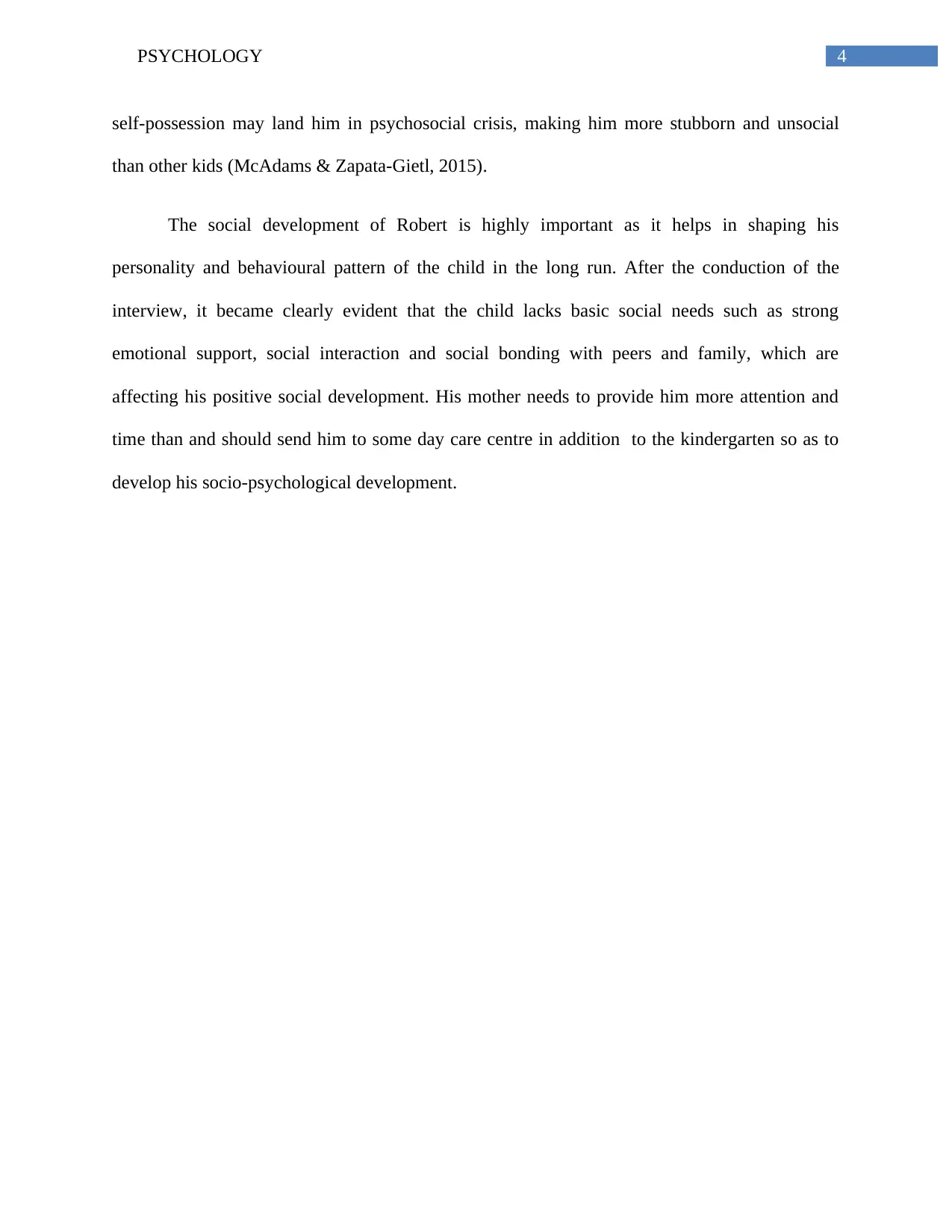
4PSYCHOLOGY
self-possession may land him in psychosocial crisis, making him more stubborn and unsocial
than other kids (McAdams & Zapata-Gietl, 2015).
The social development of Robert is highly important as it helps in shaping his
personality and behavioural pattern of the child in the long run. After the conduction of the
interview, it became clearly evident that the child lacks basic social needs such as strong
emotional support, social interaction and social bonding with peers and family, which are
affecting his positive social development. His mother needs to provide him more attention and
time than and should send him to some day care centre in addition to the kindergarten so as to
develop his socio-psychological development.
self-possession may land him in psychosocial crisis, making him more stubborn and unsocial
than other kids (McAdams & Zapata-Gietl, 2015).
The social development of Robert is highly important as it helps in shaping his
personality and behavioural pattern of the child in the long run. After the conduction of the
interview, it became clearly evident that the child lacks basic social needs such as strong
emotional support, social interaction and social bonding with peers and family, which are
affecting his positive social development. His mother needs to provide him more attention and
time than and should send him to some day care centre in addition to the kindergarten so as to
develop his socio-psychological development.
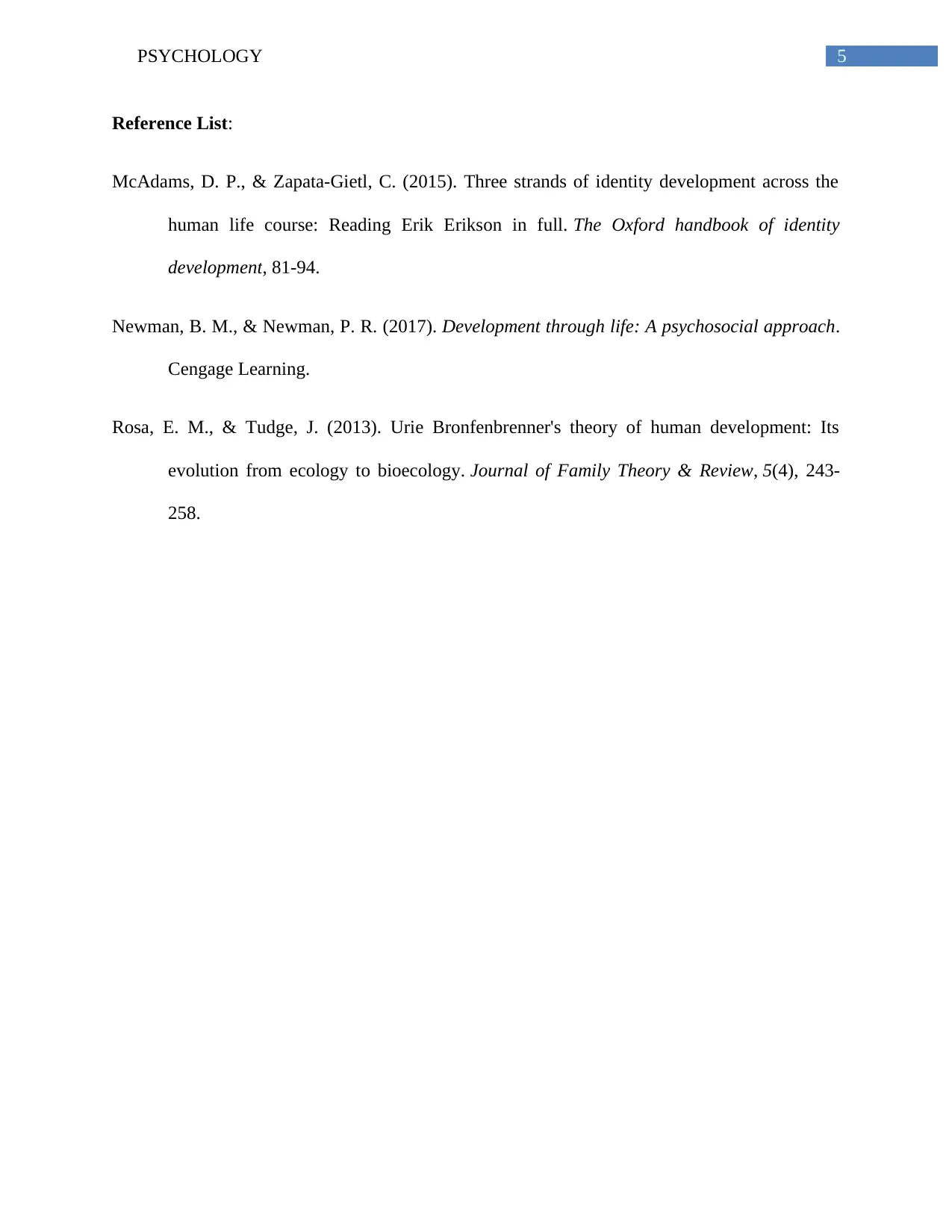
5PSYCHOLOGY
Reference List:
McAdams, D. P., & Zapata-Gietl, C. (2015). Three strands of identity development across the
human life course: Reading Erik Erikson in full. The Oxford handbook of identity
development, 81-94.
Newman, B. M., & Newman, P. R. (2017). Development through life: A psychosocial approach.
Cengage Learning.
Rosa, E. M., & Tudge, J. (2013). Urie Bronfenbrenner's theory of human development: Its
evolution from ecology to bioecology. Journal of Family Theory & Review, 5(4), 243-
258.
Reference List:
McAdams, D. P., & Zapata-Gietl, C. (2015). Three strands of identity development across the
human life course: Reading Erik Erikson in full. The Oxford handbook of identity
development, 81-94.
Newman, B. M., & Newman, P. R. (2017). Development through life: A psychosocial approach.
Cengage Learning.
Rosa, E. M., & Tudge, J. (2013). Urie Bronfenbrenner's theory of human development: Its
evolution from ecology to bioecology. Journal of Family Theory & Review, 5(4), 243-
258.
⊘ This is a preview!⊘
Do you want full access?
Subscribe today to unlock all pages.

Trusted by 1+ million students worldwide
1 out of 6
Related Documents
Your All-in-One AI-Powered Toolkit for Academic Success.
+13062052269
info@desklib.com
Available 24*7 on WhatsApp / Email
![[object Object]](/_next/static/media/star-bottom.7253800d.svg)
Unlock your academic potential
Copyright © 2020–2026 A2Z Services. All Rights Reserved. Developed and managed by ZUCOL.





